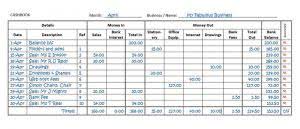
It covers a wide array of topics, including the successful efforts and full cost methods, reserve reporting, unit of production method, severance taxes, and joint interest accounting. These topics are crucial for understanding the unique accounting issues in the oil and gas industry. CFO is basically net income with non-cash charges like DD&A added back, so, despite a relatively lower charge for DD&A, CFO for an SE company will reflect the net income impact from expenses relating to unsuccessful exploration efforts. In addition to cost allocation, joint venture accounting must address the treatment of normal balance joint venture assets and liabilities.

Oil & Gas Financial Statements – Projecting Revenue and Expenses
- Exact accounting data is critical for evaluating project economics, making informed investment decisions, and planning for the future.
- Whether you’re drilling, conducting seismic testing, or carrying out other exploration activities, companies need to account for the costs of exploring and developing gas reserves.
- Depreciation involves the systematic allocation of the cost of physical assets, such as drilling rigs and production facilities, over their useful lives.
- These costs are generally categorized into exploration, development, and production costs, each with its own accounting treatment and implications.
- Well test results should be considered as preliminary and not necessarily indicative of long-term performance or of ultimate recovery.
- Any actual difference comes down to an individual company’s overall business processes and how they meet their customers’ needs.
There is no assurance that the forecast price and cost assumptions applied by McDaniel or GLJ in evaluating Gran Tierra’s or i3 Energy’s reserves, respectively, will be attained and variances could be material. There are numerous uncertainties inherent in estimating quantities of crude oil and natural gas reserves. The reserves information set forth in the Gran Tierra McDaniel Reserves Report and the i3 Energy GLJ Report are estimates only and there is no guarantee that the estimated reserves will be recovered. All reserves assigned in the Gran Tierra McDaniel Reserves Report are located in Colombia and Ecuador and presented on a consolidated basis by foreign geographic area.

Understanding Successful-Efforts and Full-Cost Accounting
- The Financial Accounting Standards Board (FASB) and the International Financial Reporting Standards (IFRS) provide guidelines to ensure consistency and transparency in revenue reporting.
- This annual publication provides an update on accounting, tax, and regulatory matters relevant to the oil and gas industry.
- LBO models are even more similar to what you see for normal companies, and just like with merger models you need to include a sensitivity analysis on commodity prices somewhere in your model.
- A significant aspect of revenue recognition in this sector is the point at which control of the product is transferred to the customer.
- This is because, like the machinery used by a manufacturing company, oil and natural gas reserves are considered productive assets for an oil and gas company.
We believe the purchase of i3 Energy uniquely positions Gran Tierra as a premier diversified oil and gas company with assets in Canada, Colombia, and Ecuador. The i3 Energy acquisition has increased Gran Tierra’s PDP reserves(1) by 42 million bbls of oil equivalent (“MMBOE”) or 96%, 1P(1) by 88 MMBOE an increase of 97%, and 2P(1) by 174 MMBOE an increase of 119%. We believe the currently depressed natural gas pricing we see in Western Canada will be alleviated as major Liquified Natural Gas projects including LNG Canada are brought online. In the short term, Gran Tierra will focus on developing the significant oil weighted assets in its Canadian and South American portfolio. The theory behind the FC method holds that, in general, the dominant activity of an oil and gas company is simply the exploration and development of oil and gas reserves.
The Net Asset Value (NAV) Model

Whether you’re drilling, conducting seismic testing, or carrying out other exploration activities, companies need to account for the costs of exploring and developing gas reserves. The forward-looking https://x.com/bookstimeinc statements contained in this press release are based on certain assumptions made by Gran Tierra based on management’s experience and other factors believed to be appropriate. The risk that the assumptions on which the 2024 outlook are based prove incorrect may increase the later the period to which the outlook relates. Actual results may vary materially from the expected results expressed in forward-looking statements.
- Production costs are typically expensed as incurred, directly impacting the income statement.
- The more you can think outside the box to challenge the status quo, the more efficiencies you’ll gain in the long term.
- Probable and possible reserves, on the other hand, carry higher levels of uncertainty but offer potential upside.
- Companies must stay abreast of these changes and adjust their accounting practices accordingly.
- Over the next decade, companies will see a fundamental transformation of how they can eliminate waste, streamline accounting, and automate daily tasks, as well as reduce overall G&A.
This is typically calculated using the unit-of-production method, which allocates costs based on the proportion of reserves extracted during a period relative to the total estimated reserves. Course DescriptionOil and gas operations have some of the most unique accounting issues found in any industry. Oil & Gas Accounting delves into acquisition, exploration, development, and production activities, covering many industry-specific accounting issues.
Oil and Gas Accounting (CPE Course)
Adherence to financial reporting standards is paramount in the oil and gas industry, given the sector’s complexity and the significant financial stakes involved. Companies must comply with both national and international accounting standards, such as the Generally Accepted Accounting Principles (GAAP) in the United States and the International Financial Reporting Standards (IFRS) globally. These standards provide a framework for consistent and transparent financial reporting, which is crucial for investor confidence and regulatory compliance. Investors are cautioned that these measures should not be construed as alternatives to net income or loss, cash flow from operating activities oil and gas accounting or other measures of financial performance as determined in accordance with GAAP.





